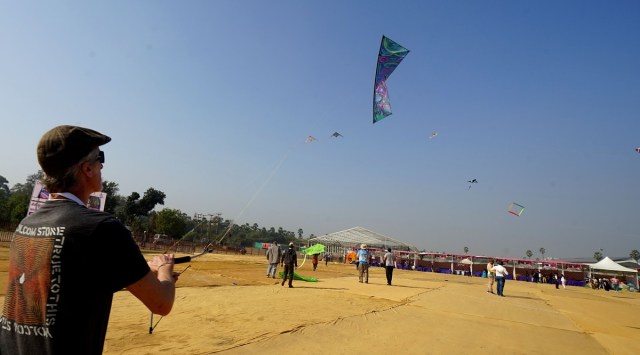Stay updated with the latest - Click here to follow us on Instagram
Chinese manjha, glass-coated cotton kite strings lethal for humans, birds alike
On Friday, the Gujarat government informed the high court it received 68 complaints in connection with the illegal trade and procurement of the banned threads since Jan 9 this year.
 The razor-sharp strings, in all forms, puts humans, birds, other animals and the environment at risk, especially if reinforced with glass powder and metal. (Representational/Express Photo by Bhupendra Rana)
The razor-sharp strings, in all forms, puts humans, birds, other animals and the environment at risk, especially if reinforced with glass powder and metal. (Representational/Express Photo by Bhupendra Rana) Since the beginning of the month, in view of Uttarayan which falls on January 14 and 15, the Gujarat Police have begun cracking down on the sale of lethal kite strings known to fatally injure birds and people. These strings include the Chinese manjha – nylon threads which are sometimes coated with powdered glass – as well as other synthetic threads that are coated with glass or emery powder.
On Friday, the state government informed the Gujarat High Court that they have received 68 complaints in connection with the illegal trade and procurement of the banned threads since January 9 this year after a helpline was set up at the direction of the court. The high court is hearing a petition seeking effective implementation of the 2016 notice of the state’s forest department. The deaths of at least six people have been recorded in the state so far due to kite strings. This mostly includes two-wheeler riders who get caught in the dangling and almost invisible loose glass strings while riding the vehicle.
Vadodara Commissioner of Police Shamsher Singh said the crackdown is against all lethal strings. “During the raids, we are seizing all kinds of threads that are dangerous. This is as per the NGT notification. The seized strings here are usually manufactured in other parts of the country and we are cracking down on traders… Some of the consignments that we seized had come from Delhi. However, we have noticed that the manufacturers have now removed branding and logos from the prohibited threads fearing police action… We are trying to create awareness about the prohibited strings,” Singh said.
The razor-sharp strings, in all forms, puts humans, birds, other animals and the environment at risk, especially if reinforced with glass powder and metal. In its release on Thursday, PETA India Advocacy Officer Farhat Ul Ain, said, “We commend the life-saving action taken by Gujarat police to seize illegal manjha… This enforcement will go a long way towards protecting the lives of humans as well as birds, including endangered vultures, who are lacerated by the sharp string,” says. “Most people would choose to use only plain cotton kite strings if they knew that doing so would spare fellow humans and other animals serious injuries and even death.”
PETA further said, “In January 2022, over 450 people sustained injuries in kite-flying accidents during Uttarayan in Gujarat… According to the chief conservator of forests in Gujarat, from 1 January 2022 to 6 June 2022, more than 1,000 birds died while over 13,000 were injured. In the first week of January 2023 alone, 482 birds were injured by manjha, including several migratory birds in the state. The wings of birds are often wounded or even cut off by manjha. Their feet have also been cut off by these strings, and birds frequently escape with such wounds, meaning rescuers cannot help them.”
In December 2016, the Gujarat Forests and Environment department issued a five-point notice under Section 5 of the Environment Protection Act, 1986, to take “necessary measures and actions including mass awareness programmes to sensitize people”. The notice asked “not to allow procuring, stocking, sale and use of nylon thread, which is also called Chinese dori or Chinese manjha and other synthetic threads coated with glass and other such harmful substances for kite flying. Even the cotton thread which is glass coated or coated with other harmful material will also not be permitted to be used for kite flying, which is likely to cause grievous injuries to the birds as well as to human beings…”
The notice had directed authorities to “stop wholesale dealing in such thread in advance and to also ensure that kite-flying is avoided between 6 am and 8 am in the morning and 5 pm and 7 pm in the evening to prevent loss of life to birds who are active in these hours.”
On January 21, 2020, the NGT ordered compliance with the original order dated July 11, 2017, prohibiting the use of threat made of nylon and synthetic material, whether or not quoted with non-biodegradable synthetic substance. The tribunal said, “This tribunal has noted its adverse impact on wildlife and human health and directed prohibition of manufacture, sale, storage, purchase and use of such thread. The direction was to be enforced by the chief secretaries of the states through the respective district administration.”
Revellers in the state seek glass-coated strings in order to ensure that the kite strings are not cut off during the competition that ensues on the day of the festival. However, two-wheeler riders are as vulnerable to fatal neck injuries as are birds due to the penetrating manjhas.
In Sama area of Vadodara last week, a two-wheeler rider suffered a fatal neck injury because of a kite string. A video which went viral shows the man parking his two-wheeler even as his clothes were soaked in blood from the bleeding neck, and he then walked to an ambulance stretcher. He died of excessive bleeding on his way to a hospital.
A city-based paramedic told this newspaper that the mechanism of a neck injury by kite string plays a vital role in ascertaining survival. “The transit time to the hospital and the interval between the injury and the actual treatment is vital as the trauma to the neck is severe in most cases. Almost 95 per cent of individuals who sustain a cervical slit do not make it to hospitals.”
Activists in cities, however, state that the crackdown has been ineffective, resulting in human deaths as well. In Vadodara, activist and advocate Shailesh Amin has written two letters to the Commissioner of Police seeking implementation of the NGT order. Amin says, “The police are cracking down on Chinese strings just like they crack down on Chinese lanterns while other locally made strings and lanterns are equally dangerous during Uttarayan… The glass-coated strings have been in use for decades, even when industrial glue was commonly hard to procure and manufacturers used glue made of rice starch and animal fat to coat glass. People want to use these to prevent their kites from being taken down as competitive kite flying is a prestige issue for many.”
A police official said the difference between banned strings and normal ones is often hard to tell. “We are not exactly able to differentiate between glass-coated strings… Some of the Chinese strings, which are essentially unbreakable nylon threads, are also coated with glass to make it more effective. Then there are other synthetic and even cotton threads that are coated with glass,” he said. The Vadodara police said it will book people found using the prohibited strings for flying kites, along with traders who sell it.







